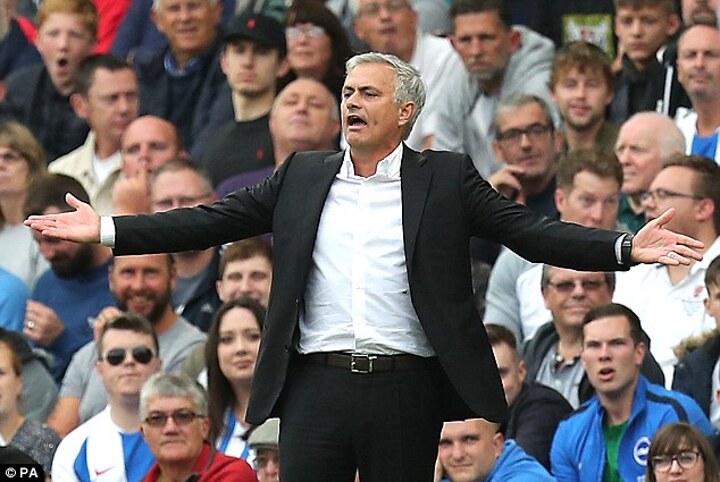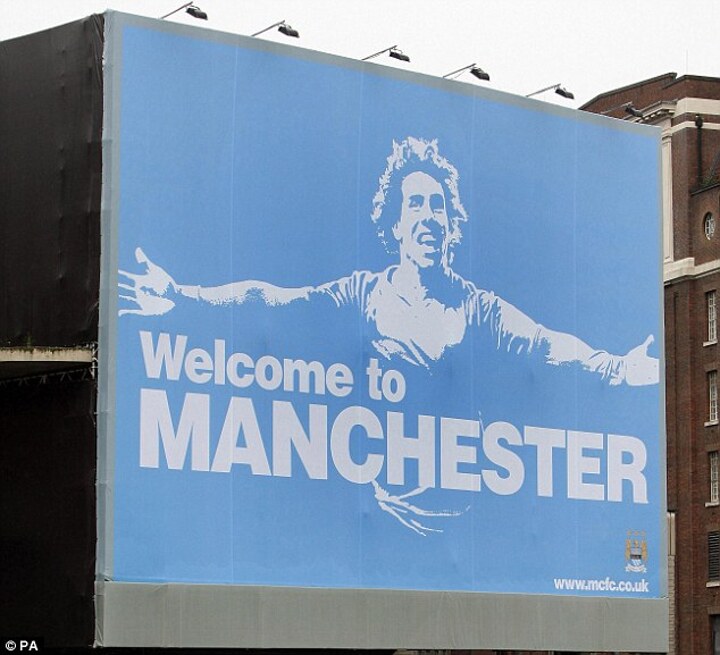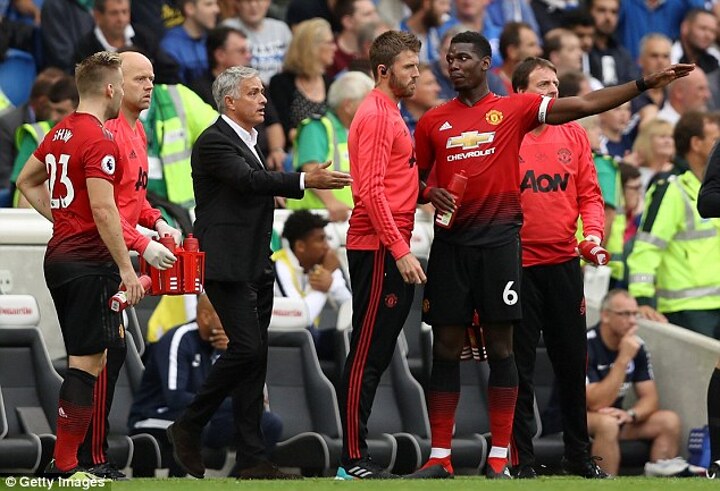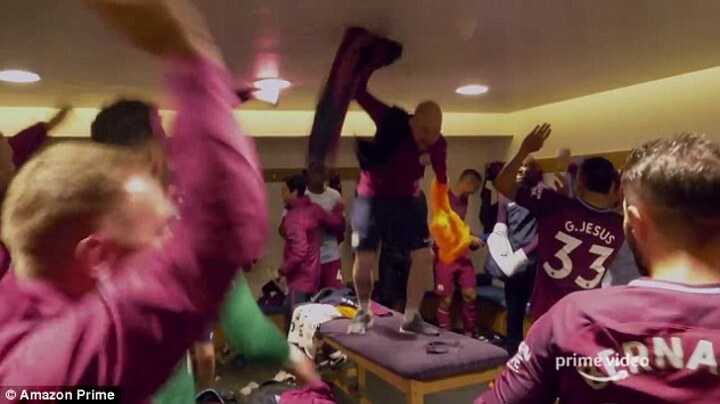The thing to remember about Manchester City is that Jose Mourinho is their ideal manager. Their ideal manager for Manchester United, of course.

In that respect, his comments are correct. City do not need him to sell their shirts, or their TV show, or their club, but he certainly helps. It is good for them to have an antagonistic rival.
They have been spoiling for this fight since the marketing department waved through posters welcoming Carlos Tevez to Manchester in 2009.
Playing the best football will only get you so far. What the modern world requires is personality, character, a back story, tension. They won't admit it, but City have been waiting for it to kick off between Mourinho and Pep Guardiola for two years.
It wasn't planned that way because, all the time they strived to recruit Guardiola, City had no way of knowing Mourinho would turn up across the road. But once it happened: bring it on. Mourinho was City's perfect appointment.
It helps that he is struggling, too. It wouldn't be so wonderful if United had been the club finishing 19 points clear last season, obviously. But this way City get the best of both worlds. They are the No 1 team in Manchester and the country — but also get to bounce off the fascination with all things Mourinho and United.
It is a Mourinho story when he snaps and berates the neighbours for lacking class over their television content — but, clearly, it's a City story, too. And that is what they need: to be talked about, to be the centre of attention.
They need to leave Mourinho like Jack Nicholson's Joker, punching a hole in the television.
'Will somebody tell me what kind of a world we live in,' he asks, 'when a man dressed up as a bat gets all of my press?'
Don't think City's increasing media profile is happy coincidence, either. Even if Guardiola had not so plainly been an upgrade on the management skills of Manuel Pellegrini, a change was needed to maximise City's potential.

The club had to become interesting beyond the locality, and Pellegrini was not a manager who talked, or would get talked about.
It is not enough for City's football to be entertaining; the club must be, too. It must represent an image, make a statement, as football's biggest entities do. This is not simply a sporting project.
It is United's shirt sales, measured in millions, that City covet — not just their sustained success under Sir Alex Ferguson.
City regard shirt sales as more important than numbers of Twitter followers and Facebook hits. The purchase of a shirt is a literal investment in the club. It is the exchange of hard cash for a look, an image. These colours represent me. These colours capture the way I wish to project myself.
United, in 2017, sold 2.85million — 560,000 more than their nearest rival, Real Madrid. A list of the top 10 shirt retailers ended with AC Milan on 650,000. City were not mentioned.
This is believed to have been rectified in the last year, but it is Liverpool and Arsenal that City are catching, not market leaders United, and yes, the global audience in particular is fickle and responds to success and star attractions.
If City are consistent over the next two decades, they could feasibly sit beside the biggest names in world football, but 20 years is a long time. A lot can change, a lot can go wrong. Who knows how long the Guardiola era in Manchester will last?
There is a feeling this is their chance and they must make the most of it. City think ahead. That is why they formed what would become the City Football Group in 2012, and that was why in 2017, for a bargain £10m, they sold the inside story of their club to Amazon Prime.
It didn't seem a cheap deal at the time. City thought they had done rather well. Only now, looking at brilliant footage of Guardiola's team talks, insights into the basic humanity of superstars such as Sergio Aguero and David Silva, the heroic narrative in what proved to be a record-breaking season, does the price seem a steal.

Amazon did a superb job and the programme is truly compelling. The aim was to produce a documentary to rival 1997's Living With The Lions, which followed the British and Irish Lions tour to South Africa, and it has done that.
Certainly, no football project that follows this will be able to pull its punches on dressing-room coverage again. The Netflix series around Juventus, that never got through those doors, already feels unsatisfying and incomplete.
Is it everything? Of course not. City had sanction over elements that were commercially or personally sensitive, as was to be expected.
They know they come out of it well, but they still took a chance. When the cameras came in, City had no idea this was going to be a successful year. It could have been ordinary, like Guardiola's first campaign — no trophies and routine Champions League qualification. The whole process could have fallen flat, become a hubristic exercise.
When Graham Taylor invited a film crew to make a programme entitled An Impossible Job, covering England's attempt to qualify for the 1994 World Cup, he did not think they were going to capture excruciating footage of a failed, chaotic campaign.
He was going to pull off this impossible job. The film would be his vindication. He would triumph against the odds, against the critics, while under extreme pressure. He would show what a smart man and manager he was.
That it ended up being regarded as football's equivalent of This Is Spinal Tap, retitled and repackaged for DVD release using one of Taylor's impotent touchline protestations, Do I Not Like That, shows what can go wrong.
What if Manchester City had come fifth? What if Guardiola had done one of his bouncing, excitable team talks only for the players to next be seen trooping back in, having lost 2-0 to Bournemouth?
So why risk it? Why, from Manchester City's point of view, take the chance when no amount of content control could guarantee the club against public humiliation if last season had been less than memorable?

The answer can be found on the pages of newspapers. Not just in the positive headlines generated since Amazon released their footage, but in the large adverts taken out since before the start of the season for The Tunnel Club, the most expensive matchday experience City offer and one that remains largely available, despite having the best view in the Premier League.
The Tunnel Club promises an 'immersive experience' — going pitchside before the game, seeing the teams in the tunnel, a tactical talk from a City coach — plus the usual comfortable seats and fine dining. And you will watch the best team in the land.
Tickets for adults cost £510 and can still be bought for every home game, bar one. Manchester United, November 11. Would a United team last seen looking half-interested while losing to Brighton sell out an Old Trafford tunnel club? Certainly.
Would Liverpool, given that they were seventh in the global shirt sales table more than a year before reaching the 2018 Champions League final, make a tunnel club work at Anfield? Quite probably.
Yet City, with decades in Manchester United's shadow, and a local fanbase proud of being the antithesis to the global, corporate super-club cannot quite get there.
This luxury perch, this immersive experience based on similarly-pitched high-end tickets at Formula One, is a harder sell to them. No, Manchester City did not make a documentary with Amazon Prime to sell £510 seats for Newcastle on September 1 — but they did make one in an attempt to become the sort of club that could do, without having to wait 20 years for it.
And they got lucky. Not just with the magnetic Guardiola and his story, not just with the uplifting narrative of the season, but with the guest star.
'You know a movie without me doesn't sell much,' sniffed Mourinho, thinking he was belittling Manchester City when, in fact, he was playing into their hands.
He is just what they need and what Manchester United thought they would never become. He is the noisy neighbour.
